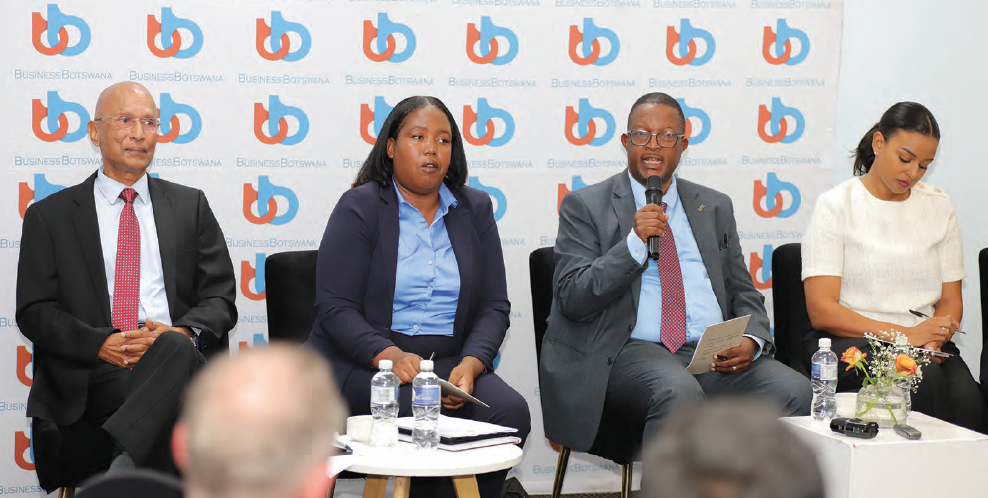As the government is expected to start negotiations with the United States of America over the tariff imposed on Botswana exports, leaders of different sectors of the economy have urged government to negotiate for zero tariff so as to dodge sharp bullet of looming massive job losses locally. The USA under president Donald Trump administration announced tariffs on commodities supplied by the key markets such as Botswana, a move that has created uncertainty despite the implementation of such being on hold for 90 days from two weeks ago.
Speaking during Business Botswana breakfast session to discuss the impact of 37% tariff on Botswana imports, the Chairperson of Manufacturing Subcommittee Tecla Evans-Mokone warned that the tariffs are very bad.
Evans warned that the manufacturing sector that has been struggling to export textiles in significant value to the USA under the African Growth Opportunity Act (AGOA) would suffer more with the tariffs that have been announced.
According to Evans-Mokone, the 37% tariff rate would make the manufacturing sector less competitive and result in high cost of production.
“AGOA was duty free on Botswana products and the textile industry was exempted. We are going to have a difficult time in exporting to the USA because other markets with less tariffs rate would excel and do better than us as a country. This would be difficult for businesses and some in the already struggling manufacturing sector could be forced to retrench employees and subsequently shut operations,” she said.
She said it is very important for the manufacturing sector to ensure that it adopts technology that can improve the quality of products exported to the USA, adding that it’s also equally important to upgrade skills of the workforce.
Botswana Chamber of Mines CEO, Charles Siwawa, said the mining industry would be much affected by the tariffs and that would affect jobs and government revenues too.
He said the USA is a key market for Botswana rough diamonds and the higher the tariffs rate would mean that Botswana would not be selling as much as it used to in that market.
Siwawa said the tariffs have no positive impact in any economy, adding that that they are terrible to any business.
“They will increase the production costs and this would bring down profitability as businesses wouldn’t be generating enough revenue. With reduced profitability, its either businesses even in the mining sector cuts staff or shutdown. Some new mines expected to operate soon locally are disadvantaged,” he said.
Siwawa also said government revenue would be impacted significantly more so that most of it comes from the minerals sector (diamonds) which are currently not doing well with regards to sales due to the weakened global demand.
He said government revenue would be lessened by the tariffs as money would be now channeled towards marketing of rough diamonds who are facing competition from lab grown in the US market.
The session reached a consensus on the urgent need for the government to create a more conducive environment for exporters and to diversify into alternative export markets. Going forward, a private sector position paper will be developed and submitted to the government to support its ongoing negotiations with the United States.
EXPERTS VIEWS
Economic experts have called on Botswana to look for an alternative markets, including considering China.
Renowned Economist and Researcher Dr Pelotshweu Moepeng has said the US is very critical to Botswana’s economy as it is one the biggest consumers of her products especially diamonds.
Dr Moepeng said figures indicate that in 2023 alone, Botswana’s exports to USA were valued at P110 million buttressing that USA is amongst top 10 lucrative destinations of Botswana’s exports globally.
“Our competitiveness would be highly affected. We are going to have revenue challenge from the government perspective. These tariffs would have ripple effects in the economy. We need funds as a country for infrastructure development, health and education sectors. The future is bleak,” he said.
Another economist and research fellow at Botswana Institute for Development Policy Analysis (BIDPA) Dr Kedibonye Thompson said the tariffs are used by USA as trade barrier and political tool to achieve some agenda.
Dr Thompson said the tariffs would result in economic uncertainty for Botswana, adding that it is high time Botswana focuses on looking for an alternative market where she can export in large volumes apart from the USA.
She said China boast of potential to become Botswana’s largest exports destination not just on the diamonds but other products.
“There is uncertainty coming out the tariffs and uncertainty affects investor confidence. We will also see volatility on our commodity products (diamonds) and this will put pressure on our fiscal position as a country,” said Dr Thompson.
In addition, Dr Thompson said local firms might hold production with the hope that uncertainty will go down but in the medium to long term this would affect employment and profits.
Meanwhile, Gihan Ilangakoon, Secretary- Botswana Diamond Manufacturers Association (BDMA) said the diamond industry would be negatively affected by the tariffs amidst slump in sales of rough diamonds.
He said the infiltration of the synthetic diamonds in the key US markets are making the situation very difficult for the rough diamonds, buttressing that tariffs would negatively impact diamond industry.
“We need lot of smart thinking to navigate the situation. The industry is quite suppressed at the moment and the economy of Botswana is affected negatively. The money would be needed to launch a campaign to market rough diamonds against synthetics but the problem is where would such money come from while the rough diamonds sales aren’t performing well at the moment,” said Ilangakoon.
